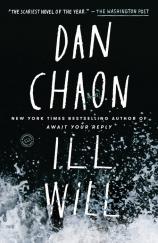Ill Will
Review
Ill Will
The questions that kept churning in my mind as I read ILL WILL were --- and still are --- 1) How does he (the “he” being author Dan Chaon) think of this stuff? and 2) How did he get it down on the page so well, in such an unlikely manner? Let’s ponder the latter question for a moment. The novel bounces back and forth in time, skipping across multiple narrators and points of view, including Dustin Tillman, a psychologist who is as unreliable a historian as you are likely to meet. It is Dustin who is a catalyst for much of what happens across time, including the incarceration of his adoptive brother for multiple murders he didn’t commit (though, as Tom Sawyer’s Aunt Polly would say, “he didn’t miss a lick”).
There are two primary plots (and a bunch of secondary ones) occurring in ILL WILL, a 400-plus-page opus that reads like a short story in all of the best possible ways. In the present, Dustin is drawn into an unofficial investigation of what may or may not be a series of murders near college campuses in Ohio and contiguous states. The catalyst for Dustin’s involvement is one of his patients, an offsetting ex-policeman named Aqil Ozorowski, who has drawn ley lines connecting a series of disappearances and drowning deaths involving college-age white males who were binge drinking shortly before their respective demises. Their deaths have been written off largely as the result of bad judgment and worse actions. Dustin finds himself oddly attracted to the theory that a serial killer is at work here, even as he isn’t fully convinced of it, at least not at first.
"Have you ever read a book that you liked so much that you were sad to have turned the last page, since you would never again be able to experience reading it for the first time? You will feel that way with this work."
Part of his attraction is the fact that one of the young men who died was a friend of Aaron, his younger son. Another is Dustin’s own history of some 30 years before, when his parents, aunt and uncle were all murdered on the eve of a family vacation. His adopted brother, Rusty, was convicted of the crime, in large part because of Dustin’s testimony. In the present, Rusty, after having spent 30 years in prison, has been exonerated thanks to newly discovered evidence. Rusty may well be innocent, if his conviction is based on Dustin’s recollections.
The reader, and those around Dustin, have ample evidence that Dustin’s memory is highly susceptible to suggestion. He also has other neurological quirks, including a tendency to leave sentences half-stated and unfinished, and the occurrence of occasional fugue states. It makes him an unreliable narrator, for sure. But what else does it make him? Are all of these present-day deaths avoidable accidental tragedies? Or are they connected by a sinister actor? Dustin is being persuaded of the latter by his patient, who is becoming aggressively friendly. If that is the case, what about the video that...? I’ll be giving away too much if I tell you about that, or about a host of other revelations that are dropped like poisoned bread crumbs throughout the narrative.
I was almost sorry that I had to finish ILL WILL. Have you ever read a book that you liked so much that you were sad to have turned the last page, since you would never again be able to experience reading it for the first time? You will feel that way with this work. Chaon tinkers with the traditional structure of the novel to great effect here, not because he can, but because he must, introducing a host of memorable characters and bumping up against taboo subjects (though never gratuitously so) along the way. Also, Chaon nails Cleveland --- specifically, the bombed-out Euclid Avenue corridor east of downtown --- so well that you’ll swear it’s in the room with you.
Trust me: If you don’t drop everything right now and read ILL WILL, you will hate yourself later.
Reviewed by Joe Hartlaub on March 10, 2017
Ill Will
- Publication Date: January 9, 2018
- Genres: Fiction, Psychological Suspense, Psychological Thriller, Suspense, Thriller
- Paperback: 496 pages
- Publisher: Ballantine Books
- ISBN-10: 0345476050
- ISBN-13: 9780345476050





